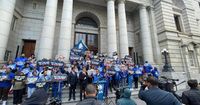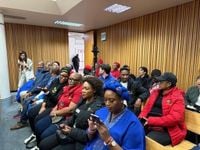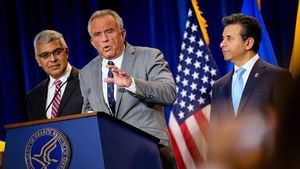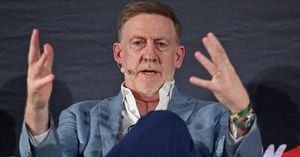The Democratic Alliance (DA) and the Economic Freedom Fighters (EFF) have united in a legal battle against a proposed increase in value-added tax (VAT) set to take effect on May 1, 2025. This challenge unfolds in the Western Cape Division of the High Court, where both parties argue that the increase, announced by Finance Minister Enoch Godongwana, is not only unconstitutional but also detrimental to the economically vulnerable population of South Africa.
On April 22, 2025, the DA's Federal Chairperson, Dr. Ivan Meyer, addressed reporters outside the court, criticizing the African National Congress (ANC) for pushing what he termed a "tone-deaf" budget. He asserted that the VAT increase would exacerbate the current cost of living crisis, stating, "The ANC doesn’t care about the poor, the working class and the general South African public." Meyer elaborated on the government's three priorities: creating inclusive economic growth, reducing poverty, and building a capable state, all of which he claims the VAT hike undermines.
In a recent budget speech on March 12, Godongwana announced a 0.5 percentage point VAT increase, raising the rate to 15.5%. The DA and EFF contend that the process leading to this decision was flawed and procedurally irregular. They oppose the adoption of the fiscal framework by the National Assembly and National Council of Provinces, which occurred on April 2, and have filed an urgent application to halt the implementation of the VAT increase.
"The VAT increase will erode inclusive economic growth," Meyer emphasized. He added that the government’s approach is not only harmful but also fundamentally flawed, arguing that it will increase poverty rather than alleviate it. The DA's Chief Whip, George Michalakis, echoed these sentiments, stating, "A minister exercising powers to impose tax laws before they are approved by Parliament strikes at the heart of the principle of separation of powers." He described the DA's legal challenge as essential for safeguarding democratic principles.
The EFF, represented by its treasurer-general Omphile Maotwe, has joined the DA's application, calling the VAT increase a "blunder" that will harm millions of South Africans already facing economic pressures. Maotwe criticized the ANC for misleading the public and accused them of failing to secure a majority in Parliament. She stated, "The parties who voted with the ANC to support a VAT increase will realize they were actually made fools."
As the legal proceedings continued, the DA's finance spokesperson Mark Burke addressed the media, emphasizing that the proposed budget is "debilitating" and will worsen the plight of South Africans grappling with rising transport costs and dwindling job opportunities. Burke warned that the budget would lead to more young people losing hope, saying, "This budget will lead to more young people losing hope when they realize they’ll be poorer than their parents." He called for a budget focused on infrastructure investment rather than new bailouts.
Both parties argue that the VAT hike is a regressive tax that disproportionately affects the poor and vulnerable. In their court application, they describe the increase as "anti-growth, anti-poor, and anti-jobs." The DA's legal team, led by Advocate Michael Bishop SC, has argued that the parliamentary process followed in approving the VAT increase was unlawful. Bishop pointed out that the VAT Act permits the Finance Minister to announce tax increases during the budget speech, which creates a "democratic deficit" by allowing tax laws to take effect before parliamentary approval.
Bishop warned that once the VAT increase is implemented, it cannot be reversed or refunded, creating a significant financial burden on consumers. "You and I and everybody in this room will start paying more when we go to the grocery store. That money will be forever in the National Revenue Fund. There’s no way to return it to consumers," he explained. This assertion highlights the potential long-term impact of the VAT increase on the South African populace.
While the DA and EFF are united in their opposition to the VAT hike, the political landscape remains complex. The ANC, supported by smaller parties in the Government of National Unity (GNU), managed to pass the fiscal framework with the understanding that discussions would take place regarding alternatives to the VAT increase. However, the DA and EFF argue that this compromise is insufficient and does not address the fundamental issues at stake.
EFF spokesperson Sinawo Thambo dismissed claims that South Africans could receive refunds if the VAT increase is later reversed, labeling such suggestions as "nonsensical". He emphasized that the window to challenge the VAT hike was during the adoption of the fiscal framework and criticized other political parties for their complicity in supporting the original framework. Thambo stated, "They must take responsibility. Now they’re twisting and turning, suggesting the VAT hike can be reversed after two months. What happens to the VAT that South Africans have already paid during that time?"
The court is expected to deliver its ruling soon, and both parties remain determined to halt the VAT increase. The DA has made it clear that while they support a national budget, it must be one that fosters economic growth and avoids wasteful spending. As the legal battle unfolds, the implications of the court's decision will resonate deeply within South Africa's socio-economic landscape.
In summary, the DA and EFF's legal challenge against the VAT increase reflects broader concerns about economic policy and its impact on the most vulnerable citizens. As the court proceedings continue, the outcome will not only determine the fate of the VAT hike but also signal the government's commitment to addressing the pressing economic challenges facing the nation.







